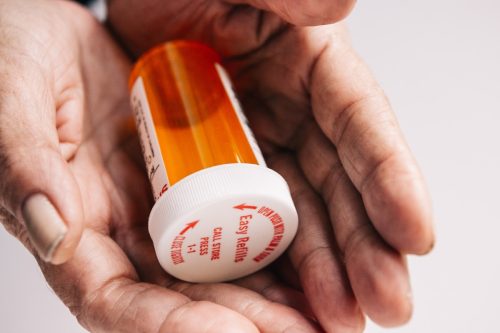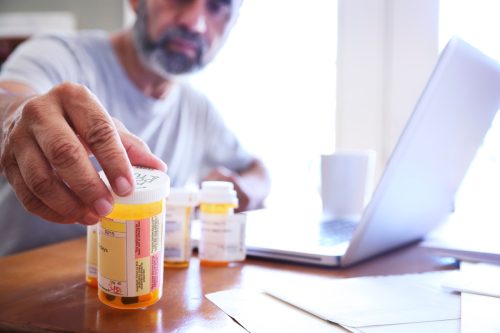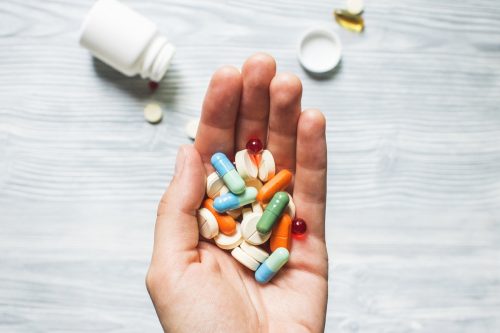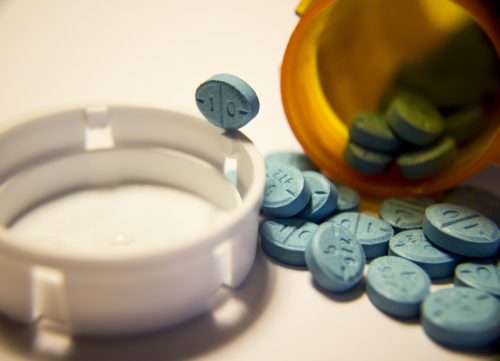These Common Medications Are All Facing Shortages, FDA Says

Over the past few years, major shortages have affected nearly every sector. We’ve seen it with toilet paper, baby formula, and even hot sauce. The COVID pandemic set off an unprecedented disruption to the supply chain in 2020, and it seems we still have a long way to go before we can set things straight. Now, the U.S. Food and Drug Administration (FDA) is alerting Americans about the over 100 medications that are currently facing shortages, including many common drugs. Read on to find out if your prescription might be affected.
READ THIS NEXT: 4 Medications Doctors Will Never Prescribe Again.
The FDA regularly updates the public about medication shortages.

Shortages may be more prevalent now than ever before, but the FDA has been keeping Americans updated on medications facing supply issues for years. The agency said it created a searchable database to provide “easy access to information about drugs in shortage, such as product availability, supply, and estimated duration of shortage.” The database is updated by the FDA daily and right now, it shows that there are 124 different medications currently battling shortages in the U.S., per a compilation by Becker’s Hospital Review.
“Drug shortages can occur for many reasons, including manufacturing and quality problems, delays, and discontinuations,” the FDA warns. “Manufacturers provide FDA most drug shortage information, and the agency works closely with them to prevent or reduce the impact of shortages.”
Several commonly used medications are on the current list.

Among the more than 100 drugs currently facing shortages, there are some commonly used medications in the mix. These include nizatidine, which is used to treat stomach ulcers and heartburn, and non-steroidal anti-inflammatory drugs (NSAIDs) like ketoprofen and diflunisal, which both reduce pain, swelling, and joint stiffness from arthritis. Medications used to treat high blood pressure—which is one of the most prevalent health problems among Americans—are also in short supply right now, including methyldopa and guanfacine hydrochloride. Epinephrine, used in emergencies to treat severe allergic reactions, is facing a shortage, too.
Jason Chou, PharmD, the vice president of pharmacy services for Ochsner Health in Louisiana, told Becker’s Hospital Review that while sometimes there are clear factors playing into these drug shortages—like workforce issues or facility shutdowns—many times it is a mystery, causing people to react “disproportionately” and create a larger shortage. According to Chou, the situation is becoming similar to what was seen in the early days of the pandemic with toilet paper.
“People didn’t need a year’s supply of toilet paper, but if you hear rumblings that toilet paper may not be available for the next couple of months, what do you do?” he said. “Quite honestly, I don’t think the drug supply chain was immune to that, especially during the pandemic.”
RELATED: For more up-to-date information, sign up for our daily newsletter.
Many medications are dealing with extended shortages.

The number of new drug shortages each year has been falling steadily since 2018, according to the American Society of Health-System Pharmacists (ASHP). But the amount of “ongoing and active shortages” is still extremely high—consistently remaining higher than 200 since 2018 and currently sitting at 264 in 2022.
Chou told Becker’s Hospital Review that the “longevity of drug shortages and the critical levels” are what is getting worse over time. “Recently, we’ve had some shortages that I think have been a lot more impactful,” he said. According to the pharmacy expert, his main concern right now is dobutamine, a blood pressure treatment that is facing a shortage due to manufacturing delays.
“Dobutamine has been a challenge off-and-on and that’s a very important drug for the treatment of heart failure patients with not a lot of other alternatives,” Chou told Becker’s Hospital Review.
Some people are growing worried about the supply of one popular daily medication.

But pharmacists and consumers across the U.S. are particularly worried about the supply of one common medication right now: Adderall. The drug, which is used to treated attention deficit hyperactivity disorder (ADHD), is currently on the FDA’s Drug Shortages list—although the agency has it under the “resolved” marker. “A drug receives Resolved status when the Drug Shortages Staff (DSS) determines that the market is covered, based on information from all manufacturers,” the FDA explains.
New reports from those across the country seem to contradict this, however. Healthline reported about the shortage on Sept. 5, explaining that experts say “production delays, regulations, overprescription, and increased demand” are all playing into an increasing issue of Adderall being hard to obtain.
“Last week, I needed my ADHD prescription refilled, but no pharmacy in my area had any,” Laura, a writer living in downtown Los Angeles, told the health news outlet. “Not the big chains, not the independents. I’m in Los Angeles, not some small town.”
Best Life offers the most up-to-date information from top experts, new research, and health agencies, but our content is not meant to be a substitute for professional guidance. When it comes to the medication you’re taking or any other health questions you have, always consult your healthcare provider directly.